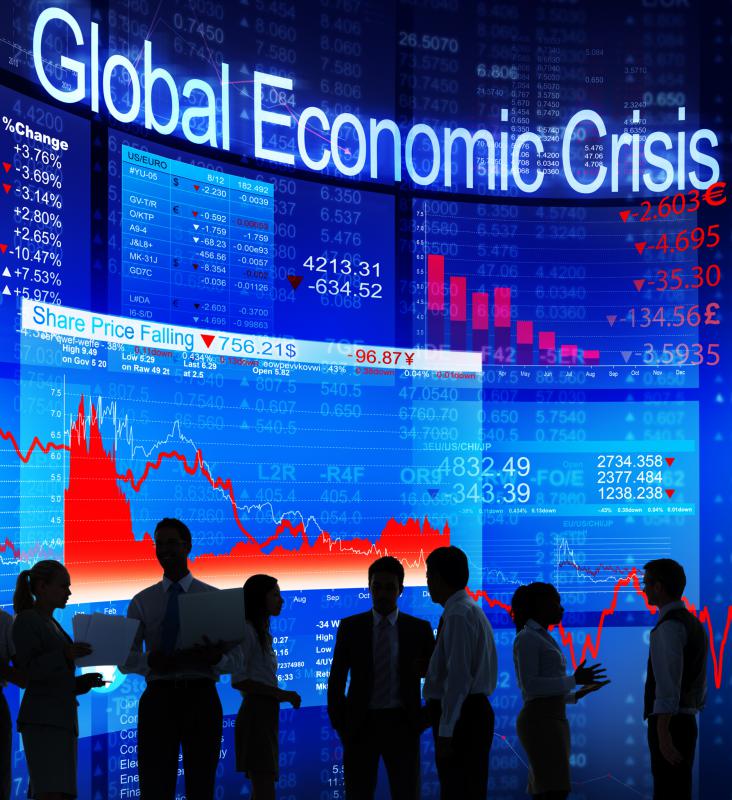At WiseGEEK, we're committed to delivering accurate, trustworthy information. Our expert-authored content is rigorously fact-checked and sourced from credible authorities. Discover how we uphold the highest standards in providing you with reliable knowledge.
What is the Global Financial Crisis?
The global financial crisis refers to a widespread economic emergency that began in 2007. Beginning with the crash of the United States financial system, the crisis quickly spread worldwide, thanks to the interconnected markets of modern global trading systems. It is still impossible to fully explain the effects of the global financial crisis, as the disaster continues to damage and impede markets worldwide even several years after the initial event.
In the United States, a series of complicated factors lead to the near-simultaneous collapse of the banking industry, financial market, housing system, and other related markets. Though the causes are still greatly argued, this event undoubtedly radiated out into the global market almost immediately. The United States traditionally plays an enormously influential part in global stock trading and financial industries, meaning that the collapse had devastating effects not only within the US but also in many or most of the countries around the world.

The widespread effects of the global financial crisis began to truly take off in late 2007, when food and fuel prices began to skyrocket worldwide. Even factors that may seem minor, such as a rise in fertilizer prices, began to damage the food importation and crop industries in developing nations around the world. As the US financial crisis deepened throughout 2008, banks and financial organizations tried to reduce spending, particularly in foreign investments. This drawback intensified the global problem, as many economies relied heavily on American foreign investing for survival.

While the economic meltdown of America was a tremendous factor, the crisis might have been more contained if not for the strong interconnected workings of the global trade market. While poor and developing nations suffered from the loss of American investments, wealthy countries also were worn down by the loss of such an influential trading partner. As the wealthy countries began to feel the effects, they too pulled back on foreign investing to protect at-home assets, leading to further troubles for the developing world.

Across the world, the global financial crisis caused large-scale drops in production, trade, and capital. Unemployment surged in many areas, while consumer prices on many basic necessities such as food and fuel continued to rise. Poverty and starvation rates increased, while even in wealthy countries recovery and growth remained sluggish.
The full effects of the global financial crisis have not yet been fully explained or addressed. More confusingly, though the timeline of the related crashes can be chronicled, the cause of the whole event is hotly debated among economists, financial professionals, and politicians. Without a complete and comprehensive understanding of the factors that caused the global financial crisis, some experts feel that the world remains extremely vulnerable to another such catastrophe.
AS FEATURED ON:
AS FEATURED ON:













Discussion Comments
@Pelestears- I think one of the biggest factors in the recovery rates of the financial crisis of 2008 has to do with the natural life cycle of a nation. The more developed a nation becomes, the more regulated it becomes because GDP growth no longer becomes the sole indicator of growth for a nation. These late stage industrialized nations tend to have an aging population, better health care, higher standards of living, and other things that are inherently unsustainable.
These factors place a large burden on the economy, so when a downturn hits, the population is so heavily leveraged that recovery takes much longer. It is always easier to dig yourself out of a hole when you have little debt than when you have per capita debt more than per capita income. This is the case for almost every European nation as well as the United States and Australia.
@PelesTears- The dynamic between the industrialized powers and the developing nations has certainly changed in the last few decades. There are a number of factors that led to the crisis as well as a number of factors that made it worse in the old economic powers than the rising nations.
I can tell you one of the major factors though...banking. The lack of regulation in U.S and European Banking allowed people to make poor decisions and sell less than ethical (or financially sound) products. In China, India, and Brazil, banking is heavily regulated r state owned so these countries did not buy the bad real estate investments and derivatives that European and American banks traded. In a sense, they dodged the biggest bullet of them all. The growth actually did not decline in most of these countries; rather it slowed, making it easier for these countries to rebound.
What I find most interesting about the 2008 global financial crisis is that developing nations recovered much faster than the industrialized nations that are still reeling three years later. I do not understand why this is the case when I hear about GDP growth in countries like China, Brazil, and India increasing at a record pace. I used to think that the success of these nations was dependent on the success of the countries they export their cheap goods to, i.e. the United States, Canada, the European Union.
Are these countries not beholden to the same energy constraints as other energy intensive countries? Were these countries not as invested in the global stock market and its mysterious derivatives? What will it take for countries like the United States to recover from this economic crisis, or will this be a lingering economic stagnation like the one Japan has dealt with for the last decade?
Post your comments